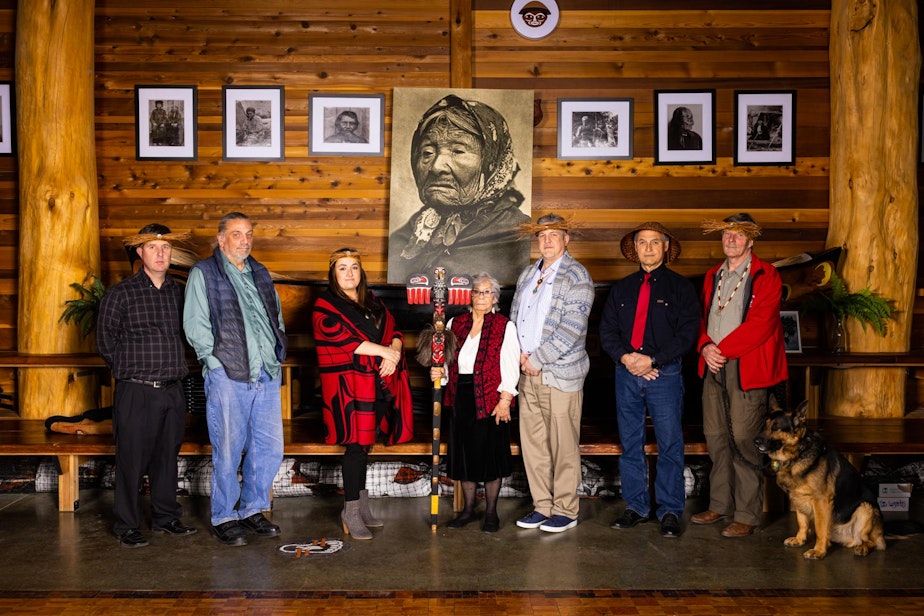Seattle's Duwamish Tribe files new lawsuit seeking federal recognition

Seattle’s Duwamish Tribe renewed its quest for tribal sovereignty by filing a lawsuit against the U.S Department of the Interior on Wednesday. The tribe said the lack of federal recognition continues to cost its 600 enrolled members access to healthcare, scholarships, and other benefits.
“As an unrecognized tribe we have limitations, we cannot fully practice our culture," Desiree Fagan, a member of the tribal council, said. "We have to ask permission to display our own artifacts and care for our ancestor’s bones. We have had to buy back the land our longhouse stands on.”
The lawsuit comes as thousands of people are donating to the tribe’s operations through the nonprofit Real Rent Duwamish, and land acknowledgements put a spotlight on the loss of tribal lands.
At a press conference announcing the lawsuit at the Duwamish Longhouse and Cultural Center on Wednesday, James Rasmussen, a member of the tribal council who has also led efforts to restore the Duwamish River, said the place and the people are inextricably linked.
"The recovery of the Duwamish River must include the restoration of the Duwamish Tribe," he said. "And we hope that they all happen together.
In a sign of changing times, both the plaintiff and the defendant in the federal lawsuit are Indigenous women. Plaintiff Cecile Hansen is the great-great-great-grand niece of Chief Seattle, the signatory of the 1855 Treaty of Point Elliott, on which the tribe’s claims rest. She is the chairwoman of the Duwamish Tribal Council. The defendant is U.S. Interior Secretary Deb Haaland, the first Native American to serve in a cabinet post.
Sponsored
According to the lawsuit, Congress, the courts and the Department of Interior itself have all recognized the Duwamish Tribe at various points in history, yet that recognition was never formally granted. Federal recognition would make the Duwamish Tribe eligible for benefits including land, health care, education, and revenue streams from casinos, according to NPR.
The lawsuit said the Duwamish Tribe first petitioned for federal recognition in 1977, but that in 1979, a federal judge "concluded that the Duwamish Tribe was not the successor in interest to the tribe that signed the Treaty.”
The lawsuit adds, “The Ninth Circuit affirmed, concluding that although the Duwamish Tribe, among other tribes, has a formal Constitution and government, engaged in organized fishing operations, and had previously pursued treaty claims, the Duwamish Tribe had not sufficiently 'controlled the lives of the members,' nor 'clearly established . . . [a] continuous informal cultural influence,' and many female members 'have intermarried with non-Indians and many are of mixed blood.'"
Sponsored
The latest lawsuit seeks a judicial declaration that the Duwamish Tribe is a recognized Indian tribe. Attorney Bart Freedman said some recent rulings make him more optimistic about the tribe's current legal challenge.
“There’s some emerging principles in the way tribes are treated. And the U. S. Supreme Court in a case called McGirt v. Oklahoma recently said a promise made is a promise that needs to be kept," Freedman said. "The United States can’t expel and then say ‘you don’t exist as a tribe, we don’t see you here in Seattle.’”
The lawsuit also claims that the Department of Interior's previous policies are unconstitutional because they grant "differential treatment of the Duwamish Tribe on the basis of sex, as a matrilineal tribe whose present-day membership primarily descends from Duwamish women.”
Shelby Stoner, another member of the legal team, said, “At the very least this lawsuit is being filed to stop the Department of Interior from discriminating against the Duwamish Tribe because of the sex of their ancestors.”
The lawsuit said without federal recognition, “Duwamish Tribal Services has struggled to provide numerous social, educational, health, and cultural programs.” But the Department of the Interior under the Obama administration denied the tribe’s most recent petition in 2015.
Sponsored
In recent years Duwamish Tribe has offered cultural and environmental programs through its Duwamish Longhouse and Cultural Center.
The Muckleshoot Tribe contests the Duwamish claim for federal recognition, and has bought newspaper ads and radio underwriting, including on KUOW, to offer a different message. Their website states, "The Muckleshoot, Tulalip, and Puyallup Indian Tribes stand together in opposition to granting the Duwamish Organization federal recognition."
It states that a ruling upheld by the U.S. Supreme Court in the 1970s “affirmed United States’ recognition of the Muckleshoot Tribe as a political successor to Duwamish and Upper Puyallup bands that were party to the Treaties of Point Elliott and Medicine Creek, including the Duwamish band to which Chief Seattle belonged.” It also states, "More than 95 percent of the Muckleshoot Tribal members descend from the Duwamish People."
At Wednesday's press conference, James Rasmussen said his message to those opposing tribes is that, "Our fight is not with you. Our fight is with the federal government. And you should support this. Don’t listen to your attorneys that say we threaten you. We are your cousins."
This story has been updated.




